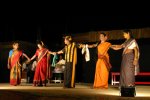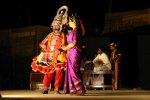The Tamil Nadu Kattaikkuttu Kalai Valarchi Munnetra Sangam is a grassroots organization that promotes the cultural and economic rights of professional Kattaikkuttu performers. It was established in 1990 by a group of seventeen performers belonging to different Kattaikkuttu theatre companies. At present the Sangam has more than two hundred members who live in the northern districts of Tamil Nadu and the Chittoor district of Andhra Pradesh. The Kattaikkuttu Sangam runs the Kattaikkuttu Youth Theatre School, which provides professional Kattaikkuttu training to underprivileged, rural children in combination with basic education. The Sangam provides a framework within which performers can discuss their professional demands and aspirations. It produces new plays, organizes theatre and other creative workshops, in addition to an annual Kattaikkuttu Festival.
The Kattaikkuttu Sangam is the organizer of the Kuttu Festival 2005 through which it wants to celebrate, together with other performers and its regular audiences, the fact that the organization exists fifteen years. For this special occasion a group of thirty-five performers who act in the nine different Kattaikkuttu performances put up by the Sangam, in addition to co-organizing the event. They special performance group represents actors and musicians drawn from two important Kattaikkuttu styles, that from around Kanchipuram-Cheyyar and that found in the Gingee-Vilupuram area.
2 hours {Private} Karna Moksham is one of the most popular plays in the Kattaikkuttu repertoire. It is attributed to the author Pukalentippulavar. Karna Moksham is performed on two important occasions. In the night preceding the sixteenth day of the funerary rites observed by rural, non-Brahmin communities, relatives of the deceased may arrange for the performance of the play. They hope that the staging of Karna Moksham will facilitate the release of the deceased's soul and allow it to ultimately reach moksham, just like the hero Karna in the play. If the deceased is a man leaving behind a wife, the play also marks the transition of the bereaved woman into widowhood. The other important occasion for the performance of Karna Moksham is a Paratam (Mahabharata) festival. The story is one of the conventional themes in the festival's cycle of plays.
The tragedy of Karna's life and defeat on the battlefield is one of the most sensitive and expressive episodes of the Mahabharata. In the Tamil Kattaikkuttu tradition the classical story has undergone a thorough reworking and adaptation to the local context. Karna's wife, Ponnuruvi, does not find a place in the written traditions of the epic. However, she fulfils a pivotal role in this performed version of the story. Because Karna's decent remains hidden for so long makes him into a person of low (or unknown) caste, highlighting the importance of caste in the local village setting. Finally, the play has incorporated a distinctive bhakti or devotional flavour, linking Karna's rebirth to that of a Tamil Saivite bhakti saint and emphasizing Karna's ultimate moksham or liberation from the cycle of rebirths through his devotion to God.
Karna, known for his generosity and loyalty, is the illegitimate son of Kunti, born to her and the Sun before her marriage to Pandu. Immediately after his birth Kunti abandoned him and placed him in a basket that drifted away along the river Ganga. The baby was found and adopted by a charioteer in Dhrtarashtra's service. Because the little boy wore ear rings and a shining protective jacket when he was found his adoptive parents called him 'Karna' ('Ear'). Subsequently, Karna becomes Duryodhana's loyal friend. In the Mahabharata war he fights on the Kauravas' side and opposes his own half-brothers, the Pandavas.
The story of Karna Moksham is situated on the seventeenth day of the war. A despairing Duryodhana appoints Karna as General of his army and sends him away with the inauspicious words “Go to the war!” (instead of using the customary expression “Go and come back”). Before going to the battlefield Karna wishes to say farewell to his wife, Ponnuruvi. Meanwhile, in the women's apartments, Ponnuruvi admits to her friends that she has had a nightmare, which she is unable to understand, but which, or so it turns out later, predicts her husband's violent death on the battlefield and her impending widowhood. Her lady-friends inform Ponnuruvi that Karna wants to see her. Upon hearing Karna's name the Queen becomes very angry. She feels she has been trapped into a déclassé marriage and she scoffs at the invitation of this 'cart man's brad'. Karna requests Ponnuruvi to give him tampulam, the auspicious gift of areca nut and betel leaves, which symbolizes victory, before he will join the battle. Ponnuruvi refuses to open her door and lets him stand outside on the doorstep to her apartments. Karna then wants to know why she has hated him from the beginning and why she thinks of him with aversion. 'Since the day we were married, you did not speak to me, my darling' Karna says. Ponnuruvi tells one of her lady-friends that there's someone standing outside at my doorstep, calling me 'my darling' and 'my dear'. 'Ask him to name his parents and his kinsmen clearly, and I will have no objection in letting him in and offering him tampulam.' Karna decides to fulfil his wife's rightful request. He reveals that he is the illegitimate child of Kunti and the Sun-God, and begins telling the story of his birth.
Ponnuruvi realizes that her husband is a royal Ksatriya, instead of being of low caste descent as she had assumed earlier. She becomes another woman, asking Karna to forgive her ignorance, and refusing to part from him. In an attempt to prevent Karna from going to the battlefield Ponnuruvi objects against his association with Duryodhana, whom she calls a jealous man of bad character who ordered the disrobing of a woman in public. What will he gain by slaying the Pandavas, his own (half-) brothers? In Ponnuruvi's opinion Duryodhana has 'bought' Karna's love by making him king of Angadesa. Karna says he values Duryodhana's friendship and loyalty above unreliable family relations — his own mother has abandoned him. At the end of their debate about Duryodhana Ponnuruvi realizes that she is unable to dissuade Karna from going to the war and offers him tampulam. However, in her confusion she does so with the wrong, left hand - another omen predicting the tragic events to follow.
Karna anticipates his own death on the battlefield. He realizes that he will never be able to win the impending battle with Arjuna, because Krishna is his bosom-friend. Krishna will see to it that Arjuna wins. He tells his wife that she should not expect to see him back alive and, leaving her behind crying, joins the battle.
Karna and Arjuna, with their respective charioteers, Salya and Krishna, oppose each other at Kurukshetra and exchange verbal insults. Aiming an arrow at Karna, Arjuna suddenly is afraid to let it go. He tells Krishna that his opponent greatly resembles his older brother, Dharmar, and that, therefore, he cannot kill him. He turns back to find out whether Dharmar is safe. When Dharmar hears through Krishna about Arjuna's 'lack of courage', the normally contemplative and peaceful older brother gets very angry. He insults Arjuna and his bow Gandiva and sends him back to the battlefield with the words: 'Let the arrow which you had pointed at me be for Karna. Consider him as your older brother and kill him!'
Once again Arjuna and Karna oppose each other on the battlefield. Karna shoots the snake-missile Asvasenan. It misses Arjuna's heart with a few inches, because Krishna makes Arjuna's chariot sink into the ground. Asvasenan pleads with Karna to use him again. Karna says he cannot do so, because he has promised his mother Kunti to use the snake-missile only once against Arjuna. Asvasenan, who is no longer of any help to Karna, expires on the spot. Expressing his utter loneliness, Karna feels that his time to die has come. He seeks refuge with Lord Krishna. Then Arjuna releases the Pasupata-weapon, which strikes Karna fatally in his breast.
Krishna, taking the form of an old Brahmin, meets the mortally wounded Karna on the battlefield. He asks him to give him the merit (tarumam), which is the result of all the good deeds (tanams) Karna has performed throughout his life. Karna consents. The gift is transferred, accompanied by the attributes used at a funeral ceremony. Because no water is available at Kurukshetra, Karna uses his own blood by shaking the arrow in his breast.
After Karna has donated his merit, Krishna grants Karna the vision of himself seated on Garuda, accompanied by his wives Radha and Rukmini. The Lord promises Karna to grant him whatever boon he wishes. Karna says that, although he could ask Krishna to give victory to Duryodhana and bring his armies back to life, he does not want to do so. He then requests two things: firstly, that as soon as he dies, his mother Kunti shall be informed. She will rush to the battlefield and proclaim publicly that Karna is her son and that he is not of low caste. Secondly, in order to reach Krishna's feet (that is, the liberation of his soul from the cycle of births) Karna wants to fulfil the good deed of feeding others (annatanam). This is the only tanam he has not been able to carry out in this life, because nobody wanted to eat in the house of a person of low caste. He asks Krishna to give him in his next births the means to be liberal and the opportunity to carry out annatanam. A moved Krishna grants Karna these favours and tells him that in his next life he will be reborn as Siruttontar Nayanar, famous for offering his own son as food to Lord Siva, after which he attains moksham. Karna dies and therewith the play reaches its conclusion.
Tamil Nadu Kattaikkuttu Kalai Valarchi Munnetra Sangam & Kattaikkuttu Youth Theatre School |

